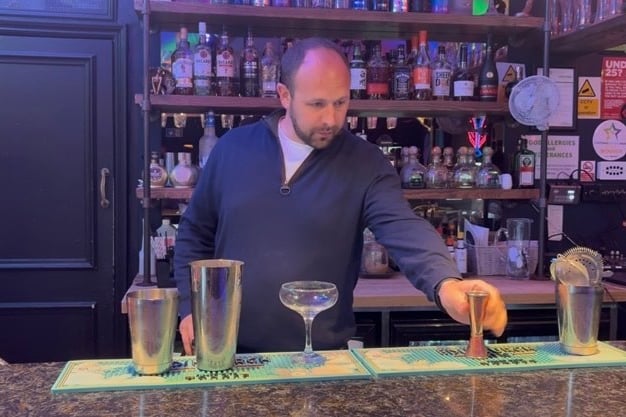Sophie Gibbs, a 19-year-old mechanical engineering student, woke up to the news that the UK Supreme Court had unanimously ruled that “sex” in the Equality Act 2010 was based on biology.
“I was disappointed, but it was not unexpected,” said Sophie, a transgender woman. She said the social climate towards trans rights is quite accepting and supportive, but the political atmosphere can be hostile. But data and analysis from YouGov suggests that “scepticism on trans rights have grown across the board in the last two years”.
Speaking in The Fallen Angel, a cabaret bar in Guildford, Sophie explained it is difficult day to day, both in being an activist and just being a trans person. “You don’t know if you’re going to be safe,” she said, “Am I going to become a target?
“Is someone gonna attack me because I’m using a bathroom, which I’m legally allowed to do.”
Sophie spoke with weighted words, as if balancing each thought in her mind before she let it pass her lips. “Why do trans rights matter? That’s an excellent question,” she said. “I had a friend who isn’t with us any more. They were a trans man […] it had a massive impact on their mental health.”
“I haven’t gone through all the effort, the costs and pain for the fun of it,” the 19-year-old said. “I do it because it hurts me, it hurts a lot of people […] people need mental and physical treatment for [gender dysphoria]. Or people will lose their lives.”

Sophie spoke emotionally and emphatically about the struggle many of her friends were going through, but she did not include herself as part of that pain. The student explained she has struggled a lot with her identity and gender dysphoria, causing her issues with her mental health.
But she said: “I feel a lot more confident now via gender reaffirming care, I have been fortunate to access. It has massively improved my mental health so I’m doing a lot better.
“That’s part of what’s given me the strength to stand up and do something. Because I know that a lot of people can’t.”
As an activist, Sophie said she often goes to protests up and down the country, with thousands of people there. “You can very easily get lost,” she said, but not an inch of humour. Instead, she seemed to recount an experience that had happened too many times, to too many people.
“You sit there and wait, to see who’s gonna turn up after the protest, and not everyone does,” she said. “I’ve had friends that have ended up with the police in cells, or in hospital wards.”
“It’s just so terrifying, even in everyday life. You don’t know which of your friends is going to be assaulted next.”
Hate crimes against transgender people in England and Wales have increased in recent years, reaching 4,780 offences in 2022/23, and only declining slightly to 4,732 offences in 2023/24.
With the new ruling, Sophie said her friends are worried it will lead to more discrimination. She said: “It lets people see trans people as less than human, kicking us out of bathrooms and changing rooms and other public spaces”
“I was fuming,” said Heather, another student, who identifies as non-binary. “It’s another thing that’s hitting our community.” They explained the ruling not only impacts trans people, but also those who are intersex or identify as non-binary.
“It allows people to think that they can discriminate against people that allows violence and hate- it just makes no sense,” the 21-year-old said. “There is so much else in the country the government should be concerned about- why are we going backwards?”
“It’s not a victory for feminism, it’s a victory for the patriarchy,” Heather said. They believed that the decision just invokes gendered ideals of what is feminine and masculine, and weaponises public spaces, like toilets.
“What about women who have PCOS who maybe grow facial hair or women who are taller and more built or butch women who appear more masculine?” they said.
“What do we have to do? Show our genitals to prove who we are? That’s absolutely obscene.”
After news was published, while women were filmed outside the courts popping open the champagne and trans activists were angry, Sophie and her friends were messaging each other. The 19-year-old said she spoke to her friends a lot about it and they were very scared.
“I’ve had a lot of my friends come to me and say: ‘Are we going to be okay?’” she said, then paused, as if steadying herself. “And it’s the first time where I can’t look them in the eye and say we’re going to be alright.”
Sophie said: “I’m 19-years-old. I don’t particularly know what I’m doing, but it’s at a certain point, when your friends’ lives are in danger, when your friends have been assaulted by people. When your friends’ mental health is suffering so much, you have to face your own fears and be terrified and do it anyway.”
In response to the court ruling, Sophie and a few of her friends have launched Surrey Trans Action (STA). Only a few weeks old, she said the group has had an immensely positive response and already has 80 members on signal.
According to Sophie, STA has three core aims. Firstly, to raise awareness of issues affecting the LGBTQ community and how to solve them; this could include talking to the general public, saying ‘these are our problems and this is how you can help’.
Fundraising for trans healthcare and supporting them is another important factor. Waiting lists for gender reassignment surgery in London is at least six years, with some people claiming it has gone up to 10. As gender reassignment surgery can be very costly, Sophie thinks the organisation will offer financial support to people in buying over the counter drugs like Hormone Replacement Therapy.
Lastly, the group not only wants to protest for trans rights, but wants to engage with Surrey MPs and councillors, what local changes they need and legislative changes.
STA organised and held their first protest on Guildford’s High Street on May 3, and was met with 200 to 300 allies and supporters. Coloured flags, people dressed in drag and vibrant placards screaming “my life is not up for debate” littered the town centre in a joyous celebration.
Nick Wyschna, who owns The Fallen Angel, said the group “packed this place out” after the protest.
He said: “It was more like a Saturday night than a Saturday afternoon.” The 41-year-old explained it was the staff’s idea to open up the cabaret bar early and let people from the protest celebrate. He said: “There was no sadness in the room that day; there was unity acceptance and support.”
Nick described he he built cabaret bar as a “safe and inclusive place for everybody”.
He said: “We often get feedback from particularly women and the queer community they can come here, be themselves and have a party.”
Sophie became more animated speaking about the previous protests she’s been to, her eyes lighting up as she replayed the joyous events she been to with her friends. She explained she has been reading a lot around the gay rights movement in American in the 1980s and 1990s and there is a quote that “very much mirrors what our community is feeling right now”.
She recited: “We went to our friend’s funeral in the morning, and protested in the afternoon and we partied in the evening.”





Comments
This article has no comments yet. Be the first to leave a comment.